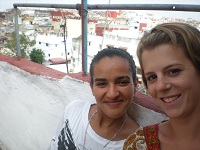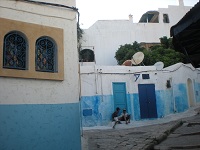Week 1 in Morocco
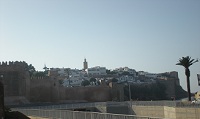
So a whole new country, a whole new continent. Prior to coming to Morocco, everyone was warning me about the extreme heat. Being from the Shire (NH) and therefore used to a minimum of 6 months of snow a year, I thought I was going to have a hard time with the weather here. Well, I have to say that upon arrival, I was amazed by how absolutely perfect it was. The sun is always shining, reflecting off of the white and blue washed buildings, and there is a beautiful breeze blowing in from the ocean. I think I was even a little cold my first few days here. Cambodia has prepared me well!
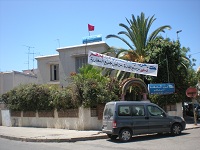
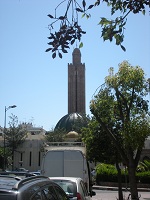
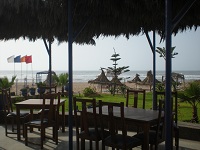
I lucked out in that my first work day was the 4th of July so I had the day off. My boss met with me for lunch and then showed me around the city and the old medina. Afterwards, I took the new tram (just opened this summer) into Agdal, the new area of town and walked around a bit, exploring on my own. I decided to try to walk back home (a new pass-time I acquired a strong fondest for while in Cambodia), but looked a bit ridiculous having to pull out my map every 50 meters. Street signage here is even worse than Cambodia, but the traffic is significantly saner. However, the looking dumb with a map worked out for the best. A nice woman who works as a cleaning lady at the Rabat University saw me twice with my map and decided to come help me. Fortunately, she was walking in the same direction as me and accompanied me most of the way home. It was an immediate friendship and we decided to meet up again so that she could help me with my Arabic and I could help her in English (we communicate in French). Even better than that, she invited me to her home in the outskirts of town for a real Moroccan lunch on Sunday. I truly appreciated making such a great friend so early on, especially since the first few days in Morocco were exceedingly lonely.
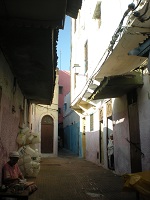
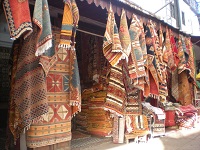
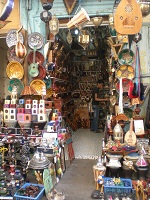
On my first day at work, I was given a research project on finding alternative sentencing options for juvenile offenders. As a signatory of the UN Convention on the Rights of the Child, prison sentences should be a last-resort when dealing with juvenile offenders in Morocco; however, imprisonment sentences remain commonplace. Our goal is to find alternative sentencing options that have been successfully implemented in other countries and then select those that would be most effective within Moroccan culture in order to propose a new sentencing system to the Moroccan Ministry of Justice. The primary goals of the alternative sentences would be to rehabilitate juvenile offenders, separate juvenile from adult offenders, and protect juvenile offenders from the negative influences of imprisonment. Finding alternatives to detention is even more imperative in the pre-trial period. According to a 2010 USAID report, of the 58,000 detainees (adult and juvenile) in Moroccan prisons, 40% of them are currently being held in pre-trial detention. The average duration of their stay in pre-trial detention is 2-3 years. Later that day, we had a business luncheon with one of the ABA’s international experts who is working with Morocco’s anti-corruption organization, the ICPC.
The following day, I was given another long-term research assignment on our anti-corruption initiative. I will be focusing on the Federal Corrupt Practices Act and, more specifically, on cases brought against corrupt practices occurring in Argentina, Italy, Ghana, England, Spain, France, the Czech Republic, Singapore, and Abu Dhabi. It was interesting to read in my initial research about cases of bribing governmental officials with jet skis, etc. Even more interesting, there has been talk about bringing up FCPA charges in the Murdoch case!
I spent most of the week focusing on these two research initiatives. On Friday, I got to join the ABA Country Director and Deputy Country Director in a meeting in Casablanca! On our way there we stopped for a typical Friday Moroccan meal of couscous. (Couscous is actually only offered on Fridays. Being the day of donating to the poor, many Moroccans give food to the impoverished on Fridays, which is why they make couscous). We were sent to interview a Casablancan lawyer as a potential domestic expert to conduct a research project on the current status of the juvenile justice system in Morocco. Having had a difficult time finding the perfect candidate, we were relieved and immediately impressed with this experienced lawyer who was clearly dedicated to the cause. After discussing the potential research assignment in further detail, the lawyer invited us to meet his colleague and a juvenile justice judge. We spent the rest of the afternoon brainstorming ideas for proceeding with juvenile justice reform. It was refreshing to see so much energy and commitment to positive change.
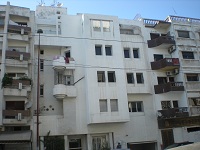
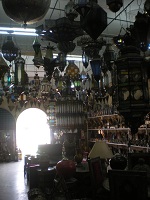
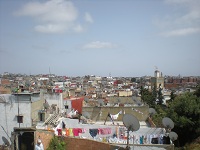
In the beginning of the week, I spent my evenings walking around the city and towards the beach. It was fun, but let’s be honest, taking pictures of yourself in a medina-no matter how fun and bustling it is- gets old after a while. Fortunately some friends that I made via email who work at the American Rabat School hosted a house warming party to celebrate moving into their new home on Thursday night. By Friday night, my contact with the US Embassy paid off and some of the US interns invited me out for dinner. Better than that, they invited me to the DCM’s (Deputy Chief of Mission= Deputy Ambassador) house for a pool party on Saturday. Prior to the pool party, my friends from the American Rabat School took me grocery shopping (stocking up on wine before Ramadan) and to Sale (Rabat’s sister city) to look at pottery and rugs. The pool party was amazing and I got to meet even more great people, the marine guards, other interns, and the children of diplomats- some of which live in Richmond!
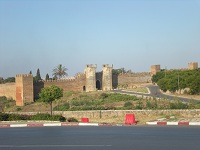
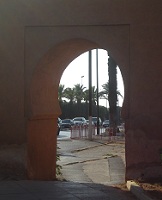
Finally it was Sunday, my big lunch with Khajidi. She made me couscous (I know, not typical for a Sunday). It was topped with chicken, chickpeas, and a delicious onion and brown sugar sauce. We ate with our hands! Well, I only ate with my hands for about 10 minutes and then finally had to give up and accept my defeat by using a fork. Can I just say, eating small grains with your hands is really hard! The drink for the meal was fermented milk, which actually isn’t as bad as it sounds. It tastes something like watered down yoghurt. Then came a delicious plate of fruits, complete with a local cactus that she taught me how to prepare. By this point, I was stuffed… but there was still more. How could I have forgotten Moroccan tea?!? Did I mention, she also taught me how to put on the hijab! Not only did we have tea and some Moroccan pastries, but she taught me how to make Moroccan mint tea. After lunch, we spent the afternoon hanging out at her place; sharing music and having her parents get frustrated by my lack of ability to communicate in Darija (Moroccan Arabic). Fortunately, she translated for me. It was so amazing being welcomed into a practical stranger’s home like that. In my experience, the Moroccan culture is extremely hospitable.
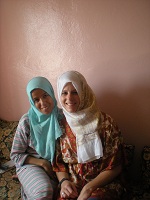
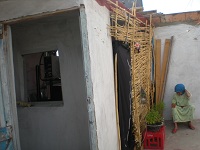
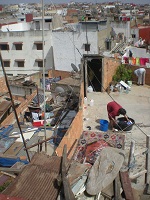
So in a week, I went from knowing no one to having a good crew of friends; from elegant US Embassy parties to eating with my hands and drinking fermented milk. I think I’m starting to have a really good feeling about this place!
